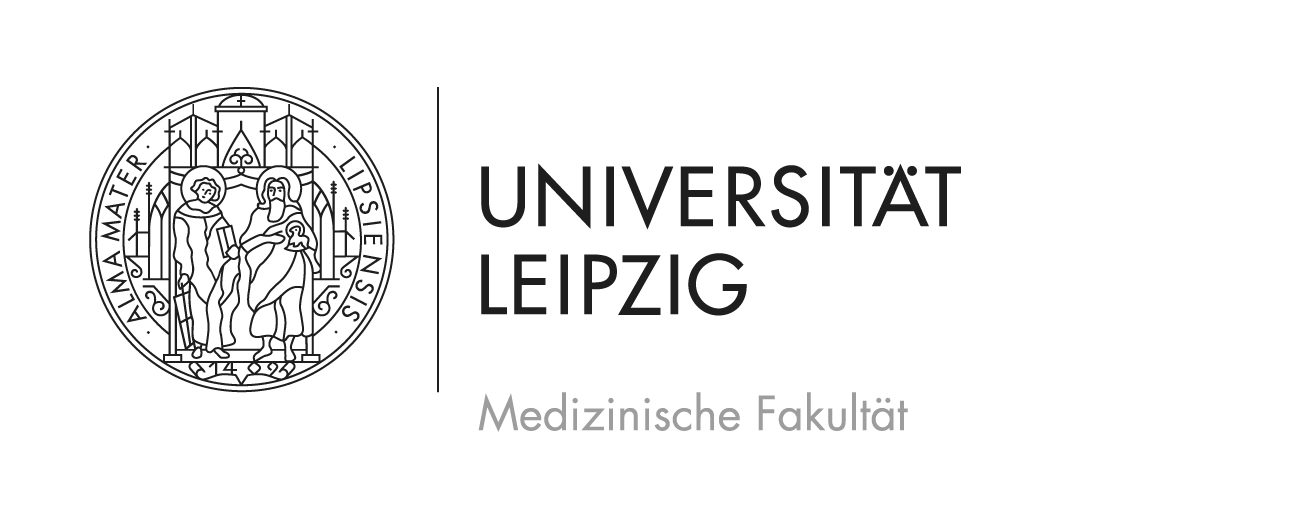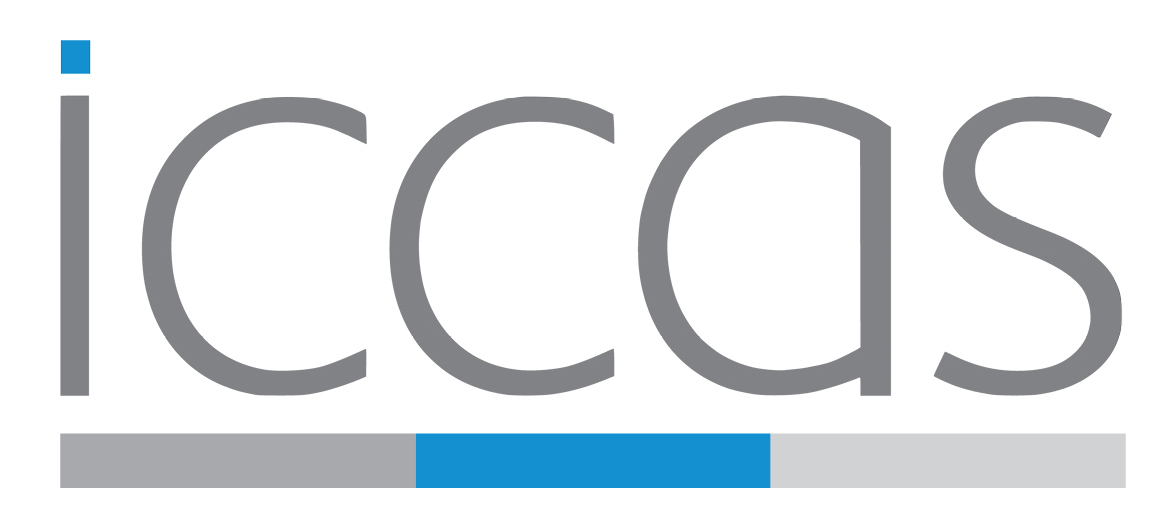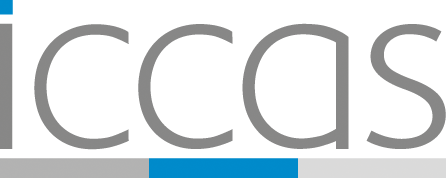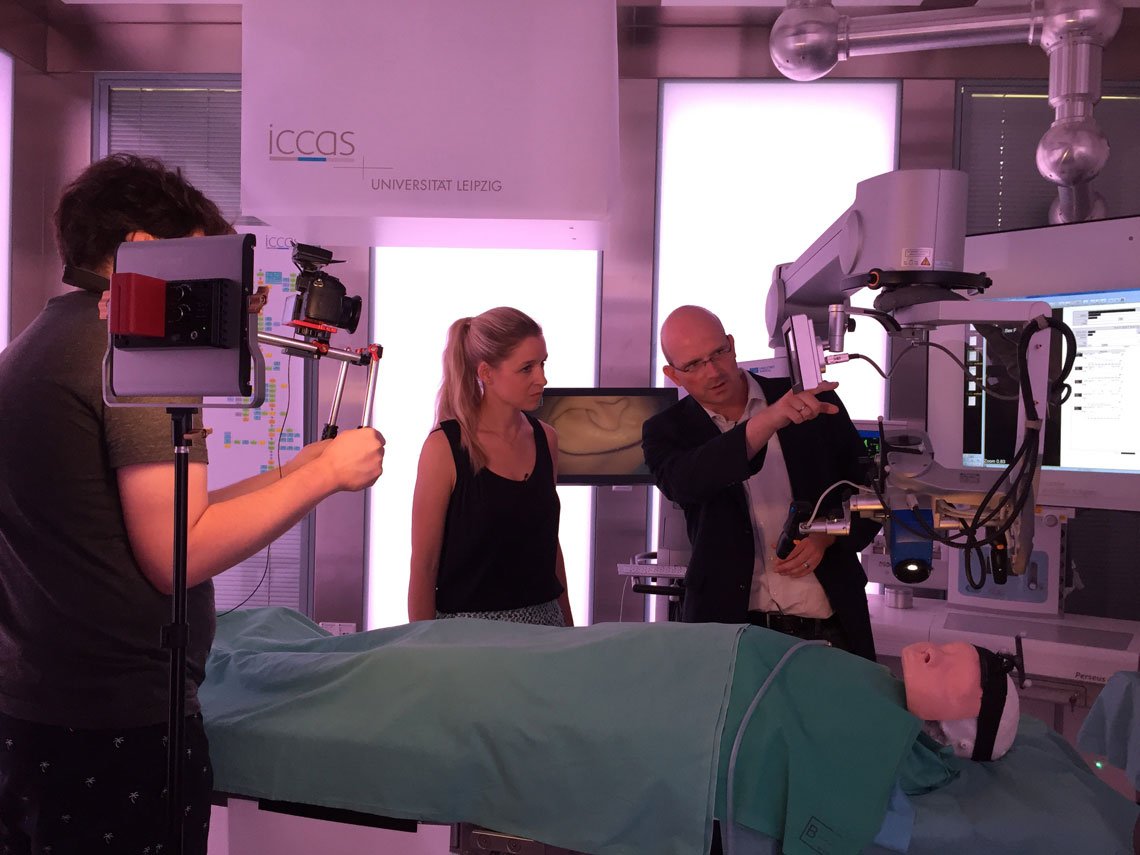
24.09.2018
 Youtuber Lisa Ruhfus Explains the Future Operating Room
Youtuber Lisa Ruhfus Explains the Future Operating Room
In August, youtuber Lisa Ruhfus looked around ICCAS and, among other things, informed herself about the functionalities of the future operating theatre. Her informative video was commissioned by the BMBF initiative “Workplaces of the Future” and is now oline to bee seen:
Video Link
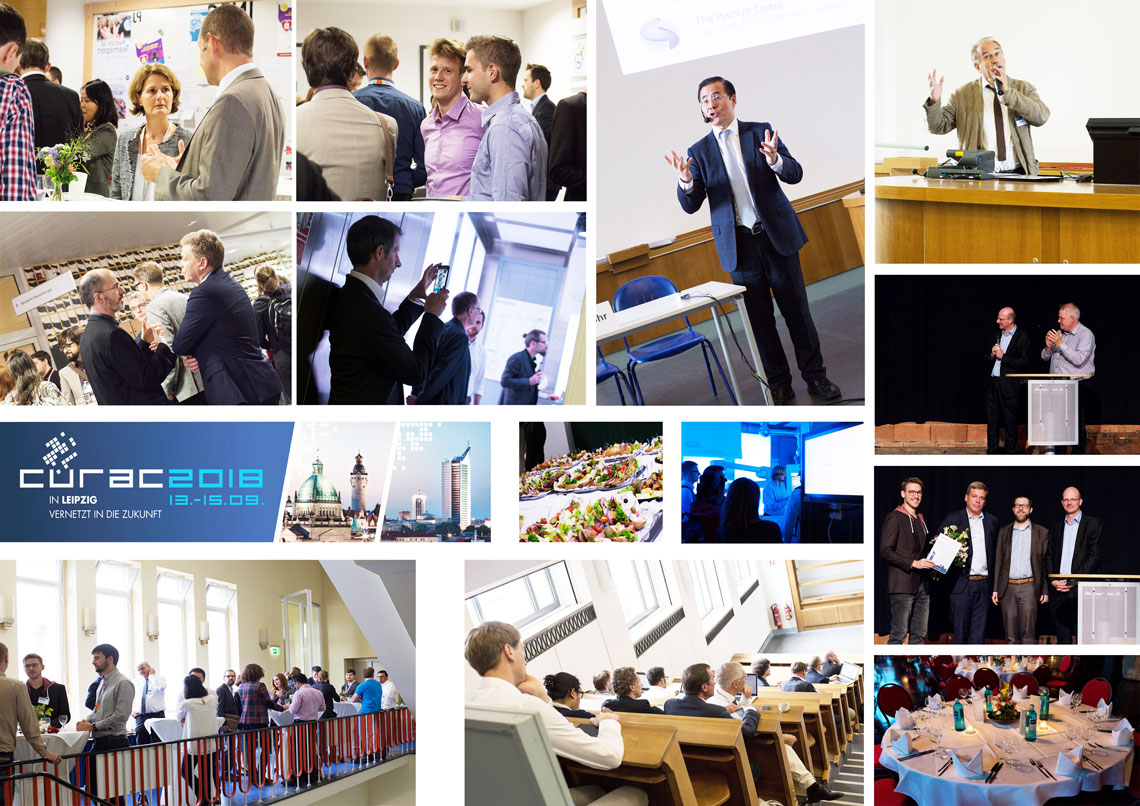
 Impressions from CURAC 2018
Impressions from CURAC 2018
On September 13-15, ICCAS invited to the 17th Annual Conference of the Society for Computer and Robotic Assisted Surgery (CURAC) at the Leipzig University Medical Campus. According to the motto “Connected into the Future” about 100 experts from the fields of medical computer science, engineering and medicine jointly discussed possibilities and challenges on computer- and robot-controlled assistances in operating rooms. The keynote speakers Prof. Guang-Zhong Yang (director of the Hamlyn Center for Robotic Surgery, London) and Prof. Jens J. Rassweiler (director of the Urology-Dept., SLK Clinics Heilbronn) held impressive lectures on worldwide developments of medical robot applications. Within the “Get Together” ICCAS presented its research world, especially the fully networked operating room. The Best Paper Award ceremony took place in the oldtimer location DaCapo on the social evening. The first prize went to Simon Strzeletz and his team from the Laboratory for Computer-Assisted Medicine at Offenburg University of Applied Sciences.
The ICCAS thanks all participants, contributors and sponsors of the CURAC 2018!
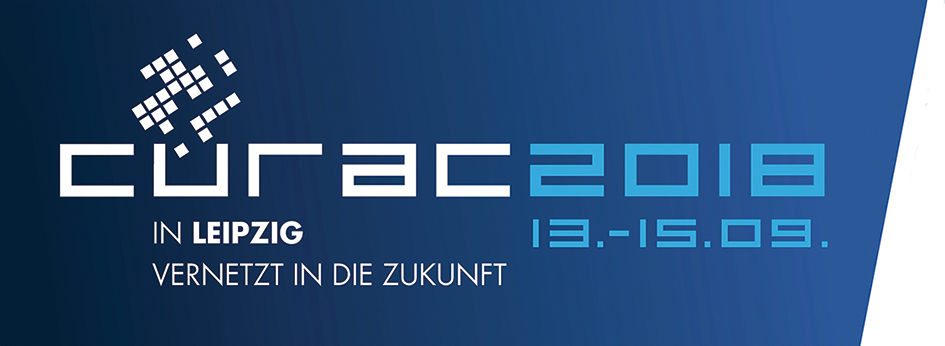
12.09.2018
 CURAC 2018 – Conference Opens its Doors in Leipzig
CURAC 2018 – Conference Opens its Doors in Leipzig
On September 13, 2018, ICCAS invites to the 17th Annual Conference of the Society for Computer and Robotic Assisted Surgery (CURAC 2018) at the Leipzig University Medical Campus. On three conference days, experts will discuss how computer- and robot-controlled technology can be used in operating rooms. The event is certified by the Saxon State Medical Association (SLÄK) with a total of 15 education points. ICCAS is looking forward to numerous participants and exciting contributions!
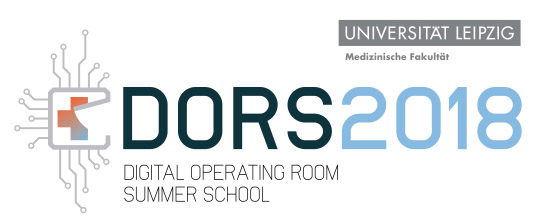
 DORS – Summer School with Focus on Computer Assisted Medicine Came to an End
DORS – Summer School with Focus on Computer Assisted Medicine Came to an End
For the fifth time, the ICCAS hosted its Digital Operating Room Summer School (DORS). In theory and practice the 16 international participants worked on different topics related to computer assisted medicine. The particularly positive feedback from the guests was mainly due to the rich and varied program and to the intensive support provided by the entire ICCAS team. Between lectures, technical exercises and OR visits there was enough time for constructive exchange and stimulating discussions between the participants and the national and international tutors. The event, accredited with 35 European CME-Credits (EACCME®), offered an interdisciplinary approach to medical and technical aspects and is annually organized in close cooperation with physicians of the Leipzig University Hospital and the Heart Center Leipzig.
This year’s focus was on topics of latest computer-assisted applications in the medical fields of: Ear-Nose-Throat Surgery, Visceral and Heart Surgery, Urology and Radiology as well as on the Digital Patient Model, Medical Robotics and future-oriented technologies for the operating theatre of tomorrow. The combination of lectures, hands-on sessions, visits to operating rooms and discussions ensured an intensive and methodically wide-ranging insight into the content. Social events offered intensive communication, relaxation and exchange of experiences.
We are already looking forward to DORS 2019.
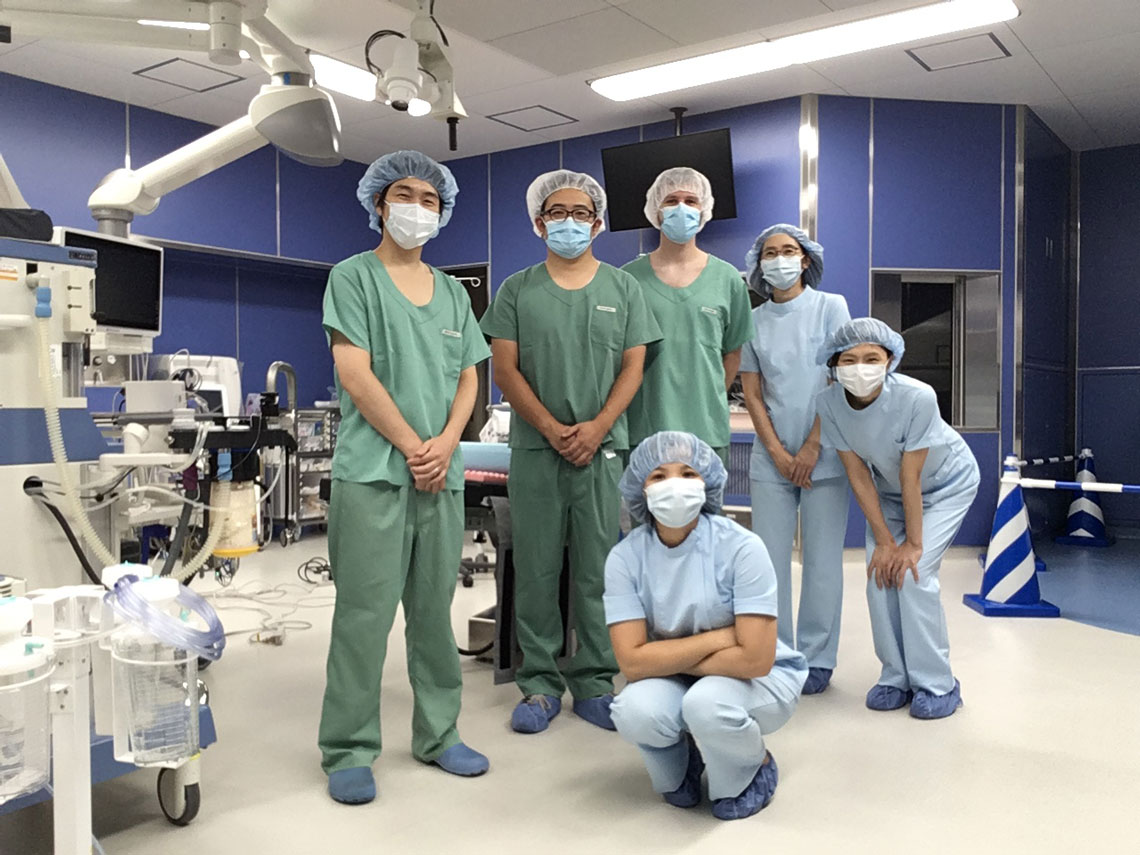
03.08.2018
 Another Research Meeting Between ICCAS and TWIns in Japan
Another Research Meeting Between ICCAS and TWIns in Japan
For the second time, ICCAS scientists visited the Joint Institution for Advanced Biomedical Sciences of Tokyo Women’s Medical University and Waseda University (TWIns) in Tokyo to discuss the topic “open networking of medical devices and IT systems in operating room and hospital”. Both institutes have been researching for years on a solution to this technological challenge, ICCAS in the OR.NET project until 2016 and today in cooperation with OR.Net e.V. and TWIns in the SCOT project. At the meeting, ideas for a technical integration of both approaches were gathered. Johann Berger worked with the Japanese colleagues on the implementation of a first software solution. During his four-week stay, he succeeded to establish a prototype connection between the two systems. This enables the communication of medical devices in Tokyo and Leipzig and serves at the basis for further research work of both teams. One highlight of the stay was the visit of the recently opened SCOT-OR at Shinshu University Hospital.
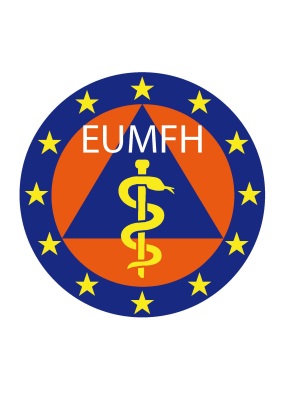
11.07.2018
 Steering Committee Meeting of the EU-Project “European Modular Field Hospital” in Leipzig
Steering Committee Meeting of the EU-Project “European Modular Field Hospital” in Leipzig
On 10 and 11 July 2018, the international steering committee members of the EU-project “European Modular Field Hospital” (EU-MFH) met in Leipzig to promote the conception of a mobile hospital for emergency operations on behalf of the EU-commission for humanitarian aid and civil protection. The aim is to improve the medical care within the scope of emergency measures of the European civil protection. Prof. Thomas Neumuth chaired the meeting, in which representatives of the humanitarian aid and civil protection of the interior ministries of nine European countries met in Leipzig. ICCAS’s project task is to control the networking of the information technology and to set the electronic patient documentation. This is intended to ensure making the work of the medical staff in the newly designed modular emergency hospital considerably easier, from diagnosis to therapy and documentation.

09.07.2018
 International ProSafeMed Network Met at ICCAS
International ProSafeMed Network Met at ICCAS
On June 28, 2018, ICCAS hosted the 3rd ProSafeMed network meeting. In the international ZIM cooperation network, which is funded by the Federal Ministry for Economic Affairs and Energy (BMWi) and coordinated by the AGIL GmbH Leipzig, next to ICCAS 22 German and Polish companies and research institutions joined forces to develop new medical devices and procedures for the European medical device market.

06.07.2018
 CURAC 2018 – We Look Forward to Your Registration!
CURAC 2018 – We Look Forward to Your Registration!
We cordially invite all interested parties to be our guest at this year’s 17th Annual Meeting of the German Society for Computer- and Robot-Assisted Surgery. It takes place at the University Medical Campus in Leipzig from September 13 – 15, 2018. Please register on the new website of CURAC e.V! (early bird until 16.08.2018)
As keynote speakers we will welcome Prof. Guang-Zhong Yang, director and co-founder of the Hamlyn Center for Robotic Surgery and Prof. Jens J. Rassweiler, founding member of the Section of Uro-Technology (ESUT) of the European Association of Urology (EAU).
The motto of this year’s event which is hosted by ICCAS is “Connected into the Future”. On the first evening, ICCAS invites to a Get-Together and presents its research world.

26.06.2018
 Prof. Melzer with Contribution at the Hamlyn Symposium in London
Prof. Melzer with Contribution at the Hamlyn Symposium in London
In the scope of this year’s Hamlyn Symposium on Medcal Robotics on June 27, Prof. Andreas Melzer will pass on his knowledge on “Ultrasound and MR guided Focused Ultrasound Therapy (SONO-RAY)” in the workshop “Image Guided Therapy”. Here, researchers from the fields of simulation and modelling, imaging and sensing, computing, robotics as well as visualisation meet to improve the localisation and targeting of pathological tissue with surgical instruments and focused energy delivery.
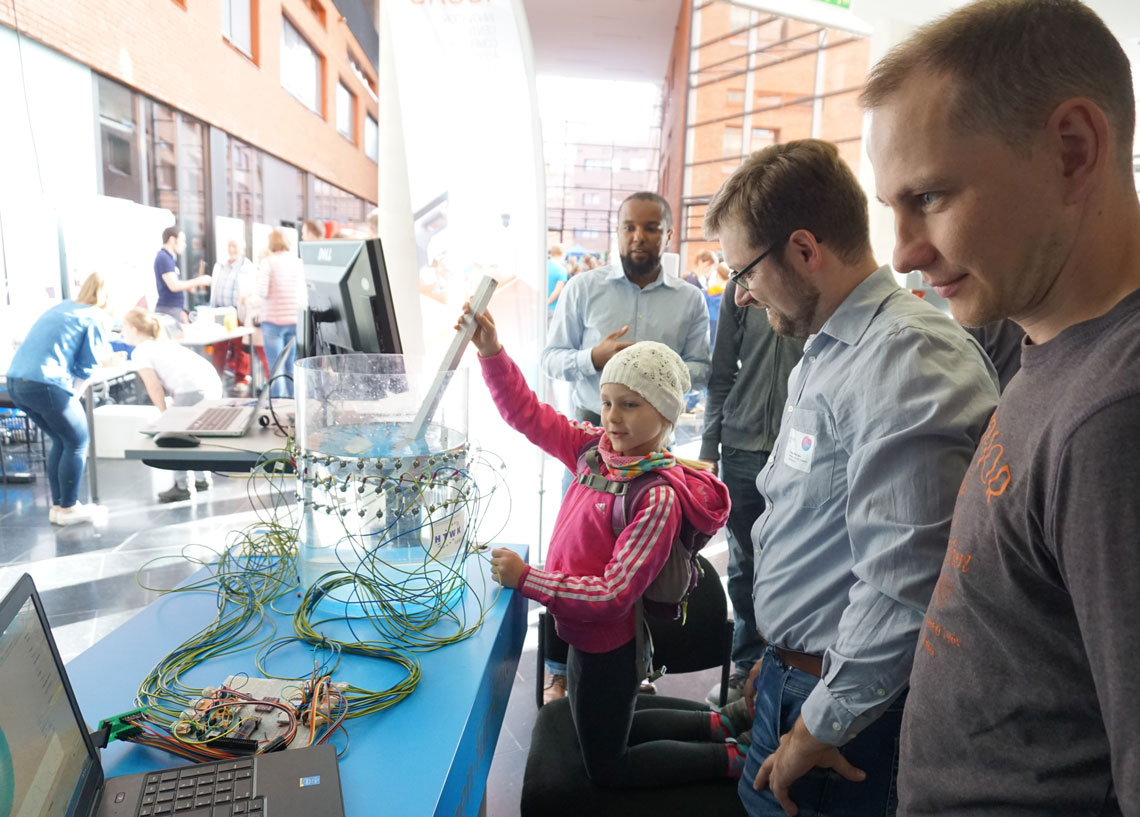
25.06.2018
 Rush of Visitors at the Long Night of Sciences
Rush of Visitors at the Long Night of Sciences
Even before the official opening of the Long Night of Sciences in the Biocity Leipzig until after midnight, the information booth of the Life Support Systems-group of ICCAS was an attraction for visitors. The scientists experimentally explained the function of Electrical Impedance Tomography (EIT), a gentle imaging method based on measurements of electrical conductivities in the human body. Many guests came especially to fasten the measuring belt and to watch their own lung function in the live image of the EIT measuring device. The children’s rallye attrackted the youngest and their parents to the booth. They had to answer the question: How does soemthing look like in the “electrical” image?
